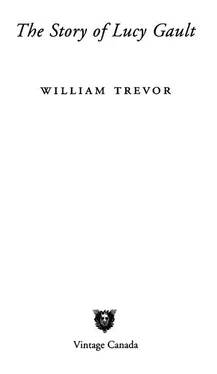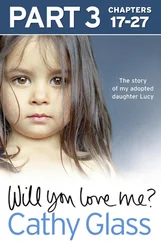Trevor, William - The Story of Lucy Gault
Здесь есть возможность читать онлайн «Trevor, William - The Story of Lucy Gault» весь текст электронной книги совершенно бесплатно (целиком полную версию без сокращений). В некоторых случаях можно слушать аудио, скачать через торрент в формате fb2 и присутствует краткое содержание. Год выпуска: 2002, ISBN: 2002, Издательство: Knopf Canada, Жанр: Старинная литература, на английском языке. Описание произведения, (предисловие) а так же отзывы посетителей доступны на портале библиотеки ЛибКат.
- Название:The Story of Lucy Gault
- Автор:
- Издательство:Knopf Canada
- Жанр:
- Год:2002
- ISBN:9780307366047
- Рейтинг книги:5 / 5. Голосов: 1
-
Избранное:Добавить в избранное
- Отзывы:
-
Ваша оценка:
- 100
- 1
- 2
- 3
- 4
- 5
The Story of Lucy Gault: краткое содержание, описание и аннотация
Предлагаем к чтению аннотацию, описание, краткое содержание или предисловие (зависит от того, что написал сам автор книги «The Story of Lucy Gault»). Если вы не нашли необходимую информацию о книге — напишите в комментариях, мы постараемся отыскать её.
The Story of Lucy Gault — читать онлайн бесплатно полную книгу (весь текст) целиком
Ниже представлен текст книги, разбитый по страницам. Система сохранения места последней прочитанной страницы, позволяет с удобством читать онлайн бесплатно книгу «The Story of Lucy Gault», без необходимости каждый раз заново искать на чём Вы остановились. Поставьте закладку, и сможете в любой момент перейти на страницу, на которой закончили чтение.
Интервал:
Закладка:
‘We have to say good-bye to Mr Aylward,’ her papa said later, finding her in the apple orchard.
She shook her head, but then he took her hand and they walked through the fields and along the strand to Kilauran. The O’Reillys’ dog watched them from the top of the cliffs, knowing better than to follow them, because her papa was there.
‘Couldn’t I stay with Henry and Bridget?’ she asked.
‘Ah no, no,’ her papa said.
The fishermen were spreading out their nets. They saluted, and her papa saluted them back. He said something about the weather and one of them said it was grand altogether these days. Lucy looked about for the fisherman who talked with his fingers, but he wasn’t there. She asked her papa and he said that man was maybe still out with his boat.
‘I’d be all right with Henry and Bridget,’ she said.
‘Ah no, darling, no.’
She reached up for his hand, turning her head away so that he wouldn’t know she was trying not to cry. When they came to the schoolroom he lifted her up to see in at the window. Everything was tidy because it was the holidays, everything left as Mr Aylward said it must be, the four empty tables, the benches pulled in to them, the charts hanging up. Bayonets were first made in Bayonne.Cider is the juice of apples. The blackboard was clear, the duster folded by the chalk box. The shiny maps – rivers and mountains, the counties of England and Ireland – were rolled up on the shelf.
‘We need a bit of time,’ her papa said in Mr Aylward’s house, his head inclined in her direction, and she knew he didn’t mean all three of them when he said we.
‘Ah, well, of course,’ Mr Aylward said. ‘Of course.’
‘It breaks my heart,’ her papa said. ‘To tell you the truth.’
Yet what else could he have done, he asked Mr Aylward, when he’d looked down at the shadows standing there, knowing there would be petrol somewhere as well, knowing that whoever was there had poisoned the dogs? He’d been nervous, firing in the dark, he said. No wonder he’d never made a soldier.
‘There isn’t any man in a family wouldn’t have done the same,’ Mr Aylward said.
A sheepdog from Lahardane had gone on to poisoned land before, Henry had said; not that that dog had died, but even so. Henry wanted everything to be all right, pretending too.
‘You keep the poetry up, girl,’ Mr Aylward said. ‘She’s right good at learning her poetry, Captain.’
‘She’s a good little girl.’
Mr Aylward kissed her, saying good-bye. Her papa finished what was in the glass he’d been given. He shook hands with Mr Aylward, and Mr Aylward said that it should come to this. Then they went away.
‘Why’d they bring petrol with them?’ she asked.
‘One day I’ll tell you about all that.’
They passed the fishermen, who were now repairing the nets they’d laid out. It was the place where the women had stood, gazing out at the sea when the Mary Nell had not returned. The women had been there when she passed on her way to school, and again on her way back, their black shawls pulled tight, nearly hiding their faces. The storm that had wrecked the Mary Nell was over then, the sun was even shining. ‘Bestow thy blessing,’ they had prayed with Mr Aylward, ‘that they may be kept safe in every peril of the deep.’ But that same day there was the sound of the women’s keening. No fisherman came back, none was rescued, because the Ballycotton lifeboat had been beaten back by the gales. No drowned body was washed up with the smashed planks and ragged strips of canvas, with the splinters of mast and boom. ‘A man’s not given back from that sea,’ Henry said. ‘In living memory and before.’ From miles out, the sharks hurried in when there were wrecks.
As she passed by the fishermen with her father, the sound of the keening, the mournful wail that carried over the half doors of the cottages, seemed to Lucy to be there again, a forlorn echo of a terrible time returning in a time that was terrible also. The cheerfulness that came now and again to Lahardane wasn’t real and only lasted for as long as they remembered to pretend.
‘I don’t want to leave Lahardane,’ she said on the strand.
‘None of us wants to, lady.’
He bent down and lifted her up, the way he used to when she was little. He held her in his arms and made her look out over the calm sea, looking for the man who spoke with his fingers, but she couldn’t see a fishing boat, nor could he. He put her down again and wrote with a pebble on the sand. Lucy Gault, he wrote. ‘Now, that’s a lovely name.’
They climbed the cliff at the place where it was easy, up to the field next to the O’Reillys’ turnip field, where there’d been barley last year. When Mr O’Reilly was weeding whatever crop was there he’d wave to her.
‘Why must we go?’ she cried.
‘Because they don’t want us here,’ her papa said.
*
Heloise wrote to her bank, in England, to explain what was about to happen and to seek advice about her holdings, all of which were in different areas of enterprise within the Rio Verde Railway Company. For generations there had been a family connection with the renowned railway, but in the present circumstances – since for a time at least her inheritance would play a greater part in her life and that of her husband and their child – her tentative query did not seem out of place and the bank’s response confirmed its wisdom. Steadfast and prosperous for almost eighty years, the Rio Verde Railway was at last beginning to display signs of what might possibly be the onset of commercial fatigue: Heloise was recommended to consider disposing of all, or the greater part, of an investment that for so long had served her family well.
In Enniseala the Captain sought confirmation or otherwise of this advice from his solicitor and friend of many years, Aloysius Sullivan, who was as knowledgeable about financial matters as he was about the law. He shared the bank’s opinion: with plenty of trading acumen left, and its accumulated funds to draw on, the Rio Verde Railway would certainly not collapse overnight, but even so a more diversified portfolio was his suggestion also.
‘No need to think about it before we leave,’ Captain Gault reported when he returned to Lahardane. Echoing again the view of the bank, the solicitor had confirmed as well that this wasn’t something to decide about in a hurry.
They talked about being in England then, of the many other practicalities they would have to see to when they were less distracted by emotion. How different their lives would be! each thought but neither said.
*
The straw fish-baskets hung in a row in the long scullery beside the cold room. They were flat and they didn’t hold much so Lucy took two, one at a time, on different days. She took bread from the bin in the pantry, a heel of white the first time, then heels of brown or soda, whatever would not be noticed. She wrapped them in the shop paper that was kept in the drawers of the kitchen dresser. She filled one basket and then the other with the packages, with apples and scallions and food she took from her plate in the dining-room when no one was noticing. She kept the baskets in a shed in the yard which no one went into, hidden behind a wheelbarrow that had fallen apart.
She rooted among the jumble on the landing for a skirt and jumper. She made a bundle of them in an old black coat of her mother’s: at night it would be cold. On the landing there was no sound except the rustling she made herself, and when she took the clothes to her hiding place she met no one on the back stairs, no one in the dog passage.
*
On the afternoon of the day before the day of the departure Captain Gault went through his papers, feeling that it was something he should do. But the occupation was tedious and, abandoning it, he dismantled instead the rifle he had fired in the night. He cleaned its parts purposefully, as if anticipating their use in the future, although he did not intend to take the rifle with him.
Читать дальшеИнтервал:
Закладка:
Похожие книги на «The Story of Lucy Gault»
Представляем Вашему вниманию похожие книги на «The Story of Lucy Gault» списком для выбора. Мы отобрали схожую по названию и смыслу литературу в надежде предоставить читателям больше вариантов отыскать новые, интересные, ещё непрочитанные произведения.
Обсуждение, отзывы о книге «The Story of Lucy Gault» и просто собственные мнения читателей. Оставьте ваши комментарии, напишите, что Вы думаете о произведении, его смысле или главных героях. Укажите что конкретно понравилось, а что нет, и почему Вы так считаете.











